6 GUIDELINES TO FOLLOW WHEN CHOOSING AN OIL SEAL
6 GUIDELINES TO FOLLOW WHEN CHOOSING AN OIL SEAL
6 GUIDELINES TO FOLLOW WHEN CHOOSING AN OIL SEAL
05 May 2022

The 6 GUIDELINES are:
1 .Material: There are 7 types of material used for oil seals, they are.
- Leather Oil Seals – They are also known as Type L Oil Seals and are used most with parts that are subject to dirt and poor lubrication. They are pre-lubricated and can absorb fluids and can provide sealing properties in conditions that synthetic rubber is unable to.
- Synthetic Rubber Oil Seals – Known as SBR Oil Seals one of the most popular oil seals as the rubber has strong resistance to abrasions and lesions which makes them ideal for fast-moving machinery. Rubber can also withstand extreme temperatures which is why it is heavily used in outdoor components.
- Nitrile Oil Seals – Also known as Acrylonitrile-butadiene rubber seals, is a particularly good general-purpose option due to its flexibility of usage. They are the most often used oil seal due to its strong resistance against hot water, fats and animal oils, gasoline, mineral oils, and grease. They cannot however survive extreme temperatures.
- Viton Oil Seals – Viton is a form of synthetic rubber and fluoropolymer elastomer; these seals provide resistance in both high temperatures up to 250°C and low compression set components. They are also strong against abrasions and chemicals, so they can be used in machinery and elements that operate with solvents and petroleum.
- Polyacrylate Oil Seals – Are mostly used in automotive and transmission industries as they can withstand fuel, oil, ozone, sunlight, and weather when used. With cars being exposed these daily they are the perfect choice. They do however become increasingly less flexible the lower the temperature gets.
- Silicone Oil Seals – Are designed to specifically to absorb excess lubricants and less the friction and wear. They offer high thermal resistance and a large temperature range. However, they don’t handle abrasions and oxidized oils well.
- PTFE Oil Seals – Are a relatively new oil seal, the use of polytetrafluoroethylene means they can withstand dry and unlubricated operations. They have a massive thermal range spanning from -130°C to more than 200°C and a strong resistance to chemicals, they are the future of rotary shaft seals.
2. PRESSURE: Oil Seals cannot endure a lot of pressure. You need to understand your machinery’s pressure capabilities and ensure you use the correct seal to withstand its pressure levels.
3. TEMPERATURE: Similar to the pressure level, you need to know what temperature your machinery can operate at. You need to choose a seal that can withstand the heat or cold. PTFE have the widest rang of temperature, making them a safe option when you are uncertain of the range.
4. SHAFT SPEED: As different shafts move at different speeds you need to consider the runout, the housing bore, and oil type being sealed. Ensure you select a seal that will not suffer from abrasions or spiralling.
5. TYPES OF FLUID: Numerous oil seals can interact with oils, fuels, grease, water and more. However, know exactly what type of fluid the rotary shaft seal will be in contact with will ensure the longevity of the seal and the machinery.
6. AMOUNT OF LUBRICANT: Seals perform better when lubricated but some machines will go through some dry spells. When this occurs using a leather or PTFE seal will be more beneficial as those type of seals can operate with less lubrication.
With the vast options of rotary shaft seals available it can be difficult to understand them and choose the correct seal for your machines. That is why are experts in Dublin and Cork are on hand to pick the right style, material, and size of the oil seal you need. Contact us today your seal specialist by email or by phone in Dublin on (0)1 427 7900 or in Cork on (0)21 500 355.
-
Post tags
